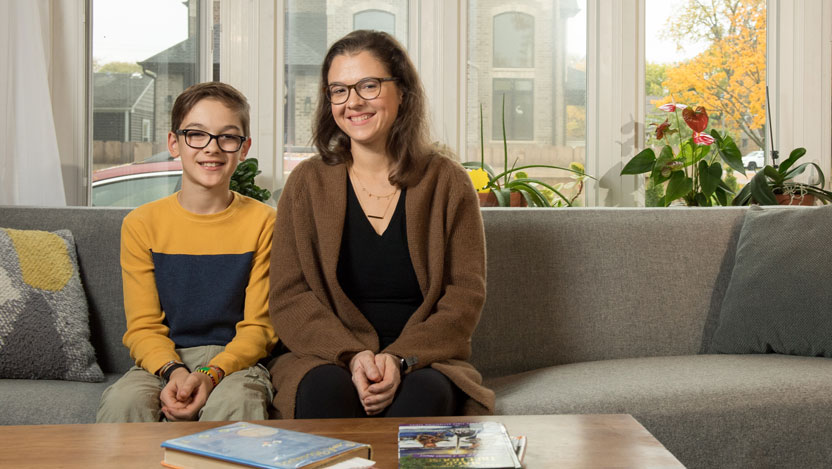11-year-old boy delays onset of Type 1 diabetes with first-of-its-kind treatment

Rimvydas Zemaitaitis was the first patient at the UChicago Medicine Kovler Diabetes Center to receive teplizumab, a drug that can delay the onset of Type 1 diabetes in high-risk individuals for at least two years.
Zivile Zemaitaitis grew up with two brothers with Type 1 diabetes, but she wasn’t prepared when her 14-month-old daughter was diagnosed in 2017.
Knowing that family members of people with Type 1 diabetes are more likely to develop the disease, Zivile, her husband, Vytas, and their other three children came to the University of Chicago Medicine Kovler Diabetes Center in 2018 to be screened for early stages of Type 1 diabetes through a study for TrialNet, a global research network of academic institutions, physicians and scientists.
Everyone came back free of signs — except 6-year-old Rimvydas.
Type 1 diabetes, a chronic condition where the pancreas produces little to no insulin, progresses in three stages. Rimvydas was in stage 1, which means he tested positive for two or more diabetes-related autoantibodies — proteins that mark insulin-producing beta cells for destruction. He later progressed to stage 2, or the equivalent of prediabetes. In addition to the presence of autoantibodies, his blood sugar levels became abnormal.
Rimvydas will likely develop Type 1 diabetes (stage 3) someday. It’s only a matter of when.
“Obviously, it’s a hard thing for a kid to hear because he’s seen what his sister goes through,” Zivile said.
Hope came for the Zemaitaitis family in November 2022, when the Food and Drug Administration approved teplizumab, the first drug to delay the onset of Type 1 diabetes. UChicago Medicine would be the first site in Chicago to offer this groundbreaking treatment for people in stage 2 of Type 1 diabetes — and Rimvydas would be the area’s first patient.

The gift of time without diabetes
In clinical trials, teplizumab has been found to delay the onset of Type 1 diabetes in high-risk individuals by two years or longer — a gift if it means someone can go months or years without enduring the chronic condition. The monoclonal antibody prolongs the pancreas’ production of insulin by interfering with immune cells that attack beta cells.
Under the care of UChicago Medicine pediatric endocrinologist Siri Atma W. Greeley, MD, PhD, Rimvydas, then 10, began treatment in March 2023. While his parents and Greeley were eager for him to undergo treatment, they also wanted it to be his choice.
That’s because the treatment requires 14 consecutive days of infusions administered through a peripherally inserted central catheter (PICC) line. Rimvydas would need to begin the infusions at UChicago Medicine Comer Children’s Hospital under the expert care of the Pediatric Special Procedures Area (SPA), the Pediatric Sedation Service and Child Life specialists who would all work together to make the process as comfortable as possible.
“It was really important to be upfront with Rimvydas. He would be missing school and might have mild symptoms,” Greeley said. “But he could very clearly see what his younger sister has to go through. However much time he might not have to deal with Type 1 diabetes was, for him, worth going through the treatment.”
Rimvydas experienced mild side effects, such as rash, itchiness and headaches. After five days of infusions at Comer Children’s, he was able to complete treatment at his family’s home in Elmhurst with the UChicago Medicine Home Infusion Therapy team, who were in daily communication with Greeley.
“It’s a lot for any kid, but the payoff is amazing,” Zivile said.
‘Just the beginning’ of Type 1 diabetes treatment
For Greeley, helping patients like Rimvydas is personal.
“My dad had Type 1 diabetes, and it’s been a part of my life since I was 14,” he said. “That’s how I ended up doing diabetes research and becoming an endocrinologist. For me, it’s been really exciting to be part of a brand-new way of conceptualizing diabetes. Instead of just treating the symptoms and complications as the disease progresses, we are now on a path to preventing it before it happens.”
UChicago Medicine was the first in Chicago to offer teplizumab to patients, and the University of Chicago’s history with the drug goes back more than 30 years with the first research that studied the potential benefits of this approach in mice.
“At the Kovler Diabetes Center, we provide comprehensive care for people with diabetes, but we’re also at the forefront of treatment and research opportunities,” Greeley said. “Teplizumab is not the end of the story at all. It’s really just the beginning.”
He hopes for broader screening of autoantibodies, as 85% of people diagnosed with Type 1 diabetes don’t have a family history and might not know to get screened. The goal is to diagnose people before they develop Type 1 diabetes, like in Rimvydas’ case, and to one day have a treatment that prevents the disease from ever reaching stage 3.
Greeley said there’s a push to make Type 1 diabetes screening — conducted via a simple blood test — as routine as childhood vaccinations.
Today, Rimvydas is still in stage 2 and gets checkups every six months. The Zemaitaitises are hopeful that teplizumab can delay the onset of Type 1 diabetes in Rimvydas for longer than two years, but there’s no magic clock that will tell them.
In the meantime, 11-year-old Rimvydas is just focused on being a kid.
“We’re doing awesome,” Zivile said. “The time that Rimvydas has been given without Type 1 diabetes is an amazing gift.”


Siri Atma W. Greeley, MD, PhD
Siri Atma Greeley, MD, PhD, is the associate director of the Kovler Diabetes Center for pediatric care. A pediatric endocrinologist, he sees children with all types of endocrine disorders or concerns, specializing in the treatment of infants, children, and teens with all types of diabetes. He is a member of the multidisciplinary patient care and research team in the University of Chicago Kovler Diabetes Center.
See Dr. Greeley's Bio